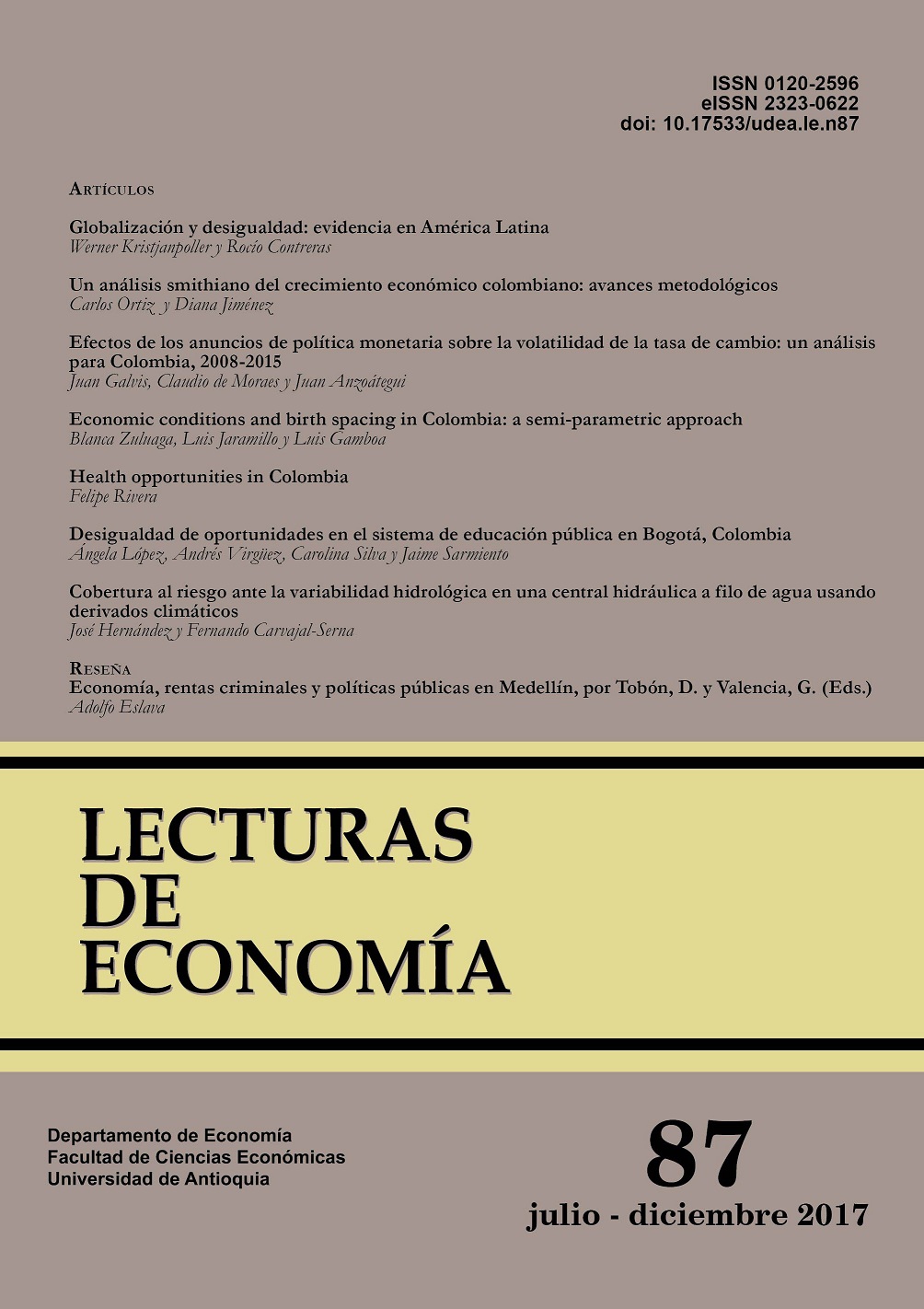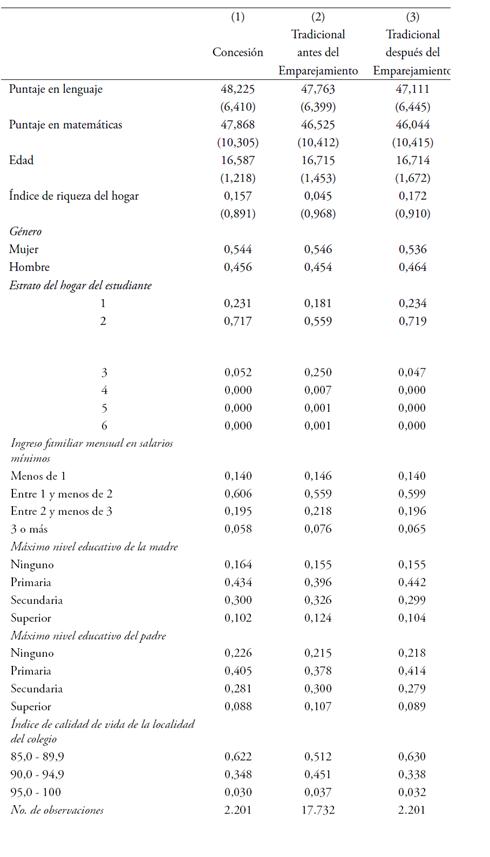Inequality of opportunity in the public education system of Bogota, Colombia
DOI:
https://doi.org/10.17533/udea.le.n87a06Keywords:
inequality of educational opportunity, public education, concession schoolsAbstract
Education is a means to equalize opportunities among individuals and to improve their welfare and future income. Nevertheless, there is limited literature assessing the degree of educational inequality in Colombia, and more so regarding public education. In this sense, this paper presents a comparative analysis of inequality of opportunity in academic achievement of two models of public education in Bogotá: traditional and concession. To do this, propensity score matching estimations are used on a dataset collected from a sample of students who took the Saber 11 test in 2012. The results indicate that concession schools exhibit a lower degree of inequality of opportunities compared with traditional public schools.
Downloads
References
Asadullah, Niaz & Yalonetzky, Gaston (2012). “Inequality of Educational Opportunity in India: Changes Over Time and Across States”, World Development, Vol. 40, No. 6, pp. 1151-1163.
Backhoff, Eduardo (2011). “La Inequidad Educativa en México: Diferencias en el Aprendizaje de la Comprension Lectora en Educación Básica”, Profesorado, Vol. 15, No. 3, pp. 87-102.
Banco Mundial (2009). La calidad de la educación en Colombia: un análisis y algunas opciones para un programa de política. Washingtong DC: Banco Mundial.
Barrera, Felipe (2007). “The Impact of Private Provision of Public Education: empirical Evidence from Bogotá’s Concession Schools”, Policy Research Working Paper Series, No. 4121. Banco Mundial.
Barrera, Felipe; Maldonado, Dario & Rodríguez, Catherine (2012). “Calidad de la educación básica y media en Colombia: diagnóstico y propuestas”, Serie Documentos de Trabajo, No. 126. Universidad del Rosario, Colombia.
Bellei, Cristián (2009). “Does lengthening the school day increase students’ academic achievement? Results from a natural experiment in Chile”, Economics of Education Review, Vol. 28, No. 5, pp. 629-640.
Bishop, John (2004). “Drinking from the Fountain of Knowledge: Student Incentive to Study and Learn-Externalities, Information Problems and Peer Pressure”, CAHRS Working Paper Series, No. 10-1-2004. Cornell University.
Bonilla, Juan (2010). “Contracting Out Public Schools for Academic Achievement: Evidence from Colombia”, Job Market Papers. University of Maryland.
Carneiro, Pedro (2008). “Equality of opportunity and educational achievement in Portugal”, Portuguese Economic Journal, Vol. 7, No. 1, pp. 17-41.
Checchi, Daniele & Peragine, Vito (2010). “Inequality of opportunity in Italy”, The Journal of Economic Inequality, Vol. 8, No. 4, pp. 429-450.
De Barros, Ricardo; Ferreira, Francisco H.G.; Vega, Jose & Chanduvi, Jaime (2009). Measuring Inequality of Opportunities in Latin America and the Caribbean. Washington DC: The World Bank.
Eyzaguirre, Bárbara (2002). “Los alumnos bajo la lupa: los exámenes externos con consecuencias individuales”, Estudios Públicos, Vol. 88, pp. 164-226.
Ferreira, Francisco & Gignoux, Jeremie (2011). “The measurement of inequality of opportunity: theory and an application to Latin America”, Review of Income and Wealth, Vol. 57, No. 4, pp. 622-657.
Ferreira, Francisco & Gignoux, Jérémie (2014). “The Measurement of Educational Inequality: Achievement and Opportunity”, The World Bank Economic Review, Vol. 28, No. 2, pp. 210-246.
Figlio, David & Lucas, Maurice (2004). “Do high grading standards affect student performance?”, Journal of Public Economics, Vol. 88, No. 9-10, pp. 1815-1834.
Formichella, María Marta (2010). Educación y desarrollo: análisis desde la perspectiva de la equidad educativa interna y del mercado laboral. Tesis para obtar al título de Doctora en Economía, Universidad Nacional del Sur, Bahía Blanca, Argentina.
Formichella, María Marta (2011a). “Análisis del concepto de equidad educativa a la luz del enfoque de las capacidades de Amartya Sen”, Educación, Vol. 35, No. 1, pp. 15-34.
Formichella, María Marta (2011b). “¿Se debe el mayor rendimiento de las escuelas de gestión privada en la Argentina al tipo de administración?”, Revista CEPAL, No. 105, pp. 151-166.
Fuchs, Thomas & Woessmann, Ludger (2007). “What accounts for international differences in student performance? A re-examination using PISA data”, Empirical Economics, Vol. 32, No. 2-3, pp. 433-464.
Gamboa, Luis (2012). “Análisis de la evolución de la igualdad de oportunidades en educación media, en una perspectiva internacional. El caso de Colombia”. En: Icfes (Ed.), Estudio Sobre Calidad de la Educación en Colombia (pp. 1-42). Bogotá D.C.: Icfes.
Gamboa, Luis; Guerra, José & Ramírez, Manuel (2008). “Subsidios en educación básica y media en Bogotá: progresividad y mercado”, Revista de Economía Institucional, Vol. 10, No. 18, pp. 287-312.
Gamboa, Luis & Londoño, Erika (2014). “Equality of Educational Oppotunities in Colombia: A Metropolitan Area Comparison”, Serie Documentos de Trabajo, No. 152. Universidad del Rosario, Colombia.
Gaviria, Alejandro & Barrientos, Jorge (2001). “Determinantes de la Calidad de la Educación en Colombia”, Archivos de Economía, No. 159. Departamento Nacional de Planeación (DNP), Colombia.
Hanushek, Eric & Woessmann, Ludger (2011). “The Economics of International Differences in Educational Achievement”. En: Eric Hanushek, Stephen Machin & Ludger Woessmann (Eds.), Handbook of the Economics of Education (Vol. 3, pp. 91-198), USA: North-Holland.
Heineck, Guido & Riphahn, Regina Therese (2009). “Intergenerational Transmission of Educational Attainment in Germany - The Last Five Decades”, Journal of Economics and Statistics (Jahrbuecher fuer Nationaloekonomie und Statistik), Vol. 229, No. 1, pp. 36-60.
Iregui, Ana María; Melo, Ligia & Ramos, Jorge (2007). “Análisis de eficiencia de la educación en Colombia”, Revista de Economía del Rosario, Vol. 10, No. 1, pp. 21-41.
Jola, Andrés (2011). “Determinantes de la calidad de la educación media en Colombia: un análisis de los resultados PISA 2006 y del plan sectorial Revolución Educativa”, Coyuntura económica, Vol. 41, No. 1, pp. 25-61.
Jones, Andrew; Roemer, John & Rosa, Pedro (2014). “Equalising opportunities in health through educational policy”, Social Choice and Welfare, Vol. 43, No. 1, pp. 1-25.
López, Ángela Rocío; Virgüez, Andrés Felipe; Sarmiento, Jaime Andrés & Silva, Adriana Carolina (2015). “El efecto de la gerencia privada de escuelas públicas en el desempeño estudiantil en la educación media en Colombia”, Ecos de Economía: A Latin American Journal of Applied Economics, Vol. 19, No. 41, pp. 108-136.
Marchionni, Mariana & Vazquez, Emmanuel (2015). “The Effect of Schooling on Skills and Knowledge in Latin America. Evidence from PISA”, CAF Working paper, No. 2015/08. CAF - Banco de Desarrollo de América Latina. Recuperado de: http://scioteca.caf.com/handle/123456789/813 (Mayo 6 de 2016).
Pessoa, Argentino (2008). “Educational reform in developing Countries: private involvement and Partnerships”, FEP Working Papers. Universidade do Porto.
Prasartpornsirichoke, Jirada & Takahashi, Yoshi (2013). “Assessing Inequalities in Thai Education”. IDEC DP2 Series, No. 3-2. Graduate School for International Development and Cooperation (IDEC), Hiroshima University. Recuperado de: http://ideas.repec.org/p/hir/idecdp/3-2.html (Febrero 10 de 2016).
Roemer, John (1998). Equality of Opportunity. Cambridge, MA: Harvard University Press.
Roemer, John (2002). “Equality of opportunity: A progress report”, Social Choice and Welfare, Vol. 19, No. 2, pp. 455-471.
Roemer, John (2014). “Economic Development as Opportunity Equalization”, The World Bank Economic Review, Vol. 28, No. 2, pp. 189-209.
Rumberger, Russell & Palardy, Gregory (2005). “Test Scores, Dropout Rates, and Transfer Rates as Alternative Indicators of High School Performance”, American Educational Research Journal, Vol. 42, No. 1, pp. 3-42.
Schütz, Gabriela; Ursprung, Heinrich W. & Woessmann, Ludger (2008). “Education Policy and Equality of Opportunity”, Kyklos, Vol. 61, No. 2, pp. 279-308.
Schültz, Gabriela; West, Martin & Woessmann, Ludger (2007). “School Accountability, Autonomy, Choice, and the Equity of Student Achievement: International Evidence from PISA 2003”, OECD Education Working Paper, No. 14. OECD Publishing, Paris.
Secretaría de Educación Distrital (SED) (2012). Sistema de evaluación integral para la calidad educativa SEICE. Bogotá: Secretaría de Educación Distrital.
Sen, Amartya (1985). Commodities and Capabilities. Amsterdam: North Holland.
Sen, Amartya (1996). “¿Igualdad de qué? Sobre el bienestar, los bienes y las capacidades”. En: M. C. Nusbaum & A. Sen (Eds.), La calidad de vida (pp. 27-53). México: Fondo de Cultura Económica.
Woessmann, Ludger (2004). “How Equal Are Educational Opportunities? Family Background and Student Achievement in Europe and the United States”. CESifo Working Paper Series, No. 1162. CESifo Group Munich.
Downloads
Published
How to Cite
Issue
Section
License
Copyright (c) 2017 Ángela Rocío López Sánchez, Andrés Felipe Virgüez Clavijo, Adriana Carolina Silva Arias, Jaime Andrés Sarmiento Espinel

This work is licensed under a Creative Commons Attribution-NonCommercial-ShareAlike 4.0 International License.
This page, by Universidad de Antioquia, is licensed under a Creative Commons Attribution License.
Authors who publish with this journal agree to retain copyright and grant the journal right of first publication, with the article licensed under a Creative Commons Attribution-NonCommercial-ShareAlike License allowing others to share it as long as they acknowledge its authorship and original publication in this journal.
Authors can enter into separate, additional contractual arrangements for the non-exclusive distribution of the journal's published version of the work (e.g., post it to an institutional repository or publish it in a book), provided that these arrangements be not for profit and the journal be acknowledged as the original source of publication.
Authors are permitted and encouraged to post their papers online (e.g., in institutional repositories or on their websites), as it can lead to valuable exchanges as well as greater citation of the published work.







 (
( (2)
(2) , que corresponde a los resultados en las pruebas de lenguaje y matemáticas en Saber 11° de 2012 para una muestra de estudiantes de Bogotá. Por su parte, en el vector de circunstancias
Ci
se consideran características de los estudiantes, de sus familias y del entorno de la institución donde asisten.
, que corresponde a los resultados en las pruebas de lenguaje y matemáticas en Saber 11° de 2012 para una muestra de estudiantes de Bogotá. Por su parte, en el vector de circunstancias
Ci
se consideran características de los estudiantes, de sus familias y del entorno de la institución donde asisten.


